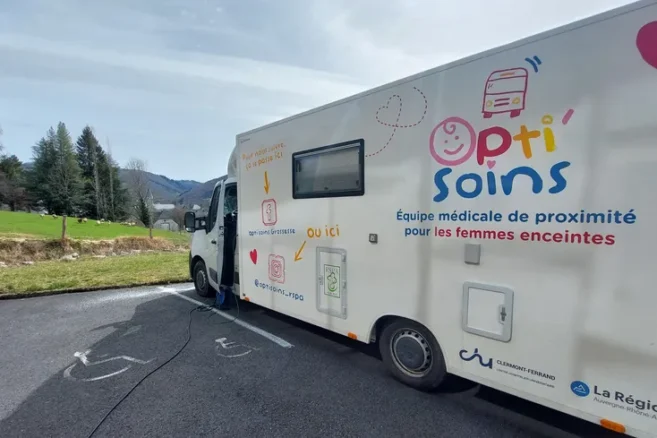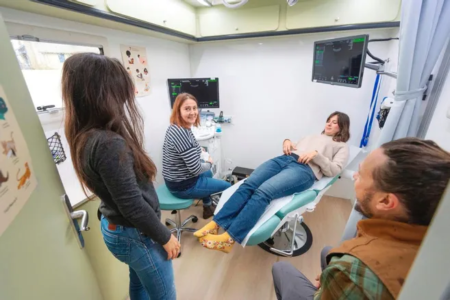Opti’soins: a mobile maternity unit for mountain women
In some mountain areas, women face growing inequalities in access to maternity care. In Auvergne (France), the “Opti’soins” initiative was launched in September 2022 to address these inequalities and better identify the need for mobile care. 110 pregnant women in 4 mountain areas benefit from this new medical assistance.
Territorial inequalities in access to care for pregnant women
Access to healthcare tends to deteriorate in many mountain areas, with the closure of many public infrastructures and the centralisation of health facilities. Obstetric care is not spared from this medical desertification of mountain areas.
In the Auvergne area, for example, there were 17 maternity units and 1 local perinatal centre (CPP) in 2003, compared with 10 maternity units and 3 CPPs in 2021. There is also a decline in the number of specialists able to monitor women’s pregnancies. In Auvergne, for example, the number of gynaecologists and obstetricians has fallen by 20% in 7 years (2008-2015), with a further drop of 15% between 2015 and 2020.
These inequalities in access to care are not without consequences for pregnant women, as research has shown that a distance of 30 minutes or more from a care structure leads to an increase in the risks and complications that can arise during pregnancy. In Auvergne, 220 municipalities and 400 women are beyond this 30-minute distance.
An obstetrics van in 4 mountain territories
The “Opti’soins” initiative was launched in September 2022 to address this lack of access to perinatal care in Auvergne. Inspired by a project carried out in the overseas territory of Mayotte, the initiative is based on organisational innovation in the hospital system by bringing care as close as possible to patients using a van and a mobile medical unit.
The van acts as a mobile care service for women living in four mountainous areas of Auvergne: Cantal, Puy-de-Dôme, Haute-Loire and Allier. It consists of a small mobile consultation room, including a small reception room and a medical examination room equipped with a monitor or ultrasound machine. The vehicle must be connected to a 220-volt socket in the municipality to ensure the operation of the medical equipment.
A midwife, an ultrasound midwife and a nurse are on board to receive patients. These staff carry out follow-up consultations and complementary examinations on the spot, directly in the municipality where the patients live.


Expected impact of the experiment
For the time being, Opti’soins remains an experiment and a research project. Within this framework, 400 women have been identified in 220 municipalities. In the first 110, women are accompanied by the maternity bus (in addition to their usual midwife) throughout their pregnancy. The other 110 small municipalities are used as “controls” for the research project, meaning that the pregnant women are not monitored by Opti’soins staff, but are interviewed about their care.
The aim of this experiment is to determine the benefits of mobile obstetric care. Although the impact on the area will remain small until the experiment ends in 2024, the project leaders are aiming to make the initiative permanent and even extend it to other types of medical care. In this case, the intention would not be to replace existing services, which are already scattered, but to complement them by bringing routine medical examinations closer to patients, while supporting the maintenance of complementary medical actions in hospitals.